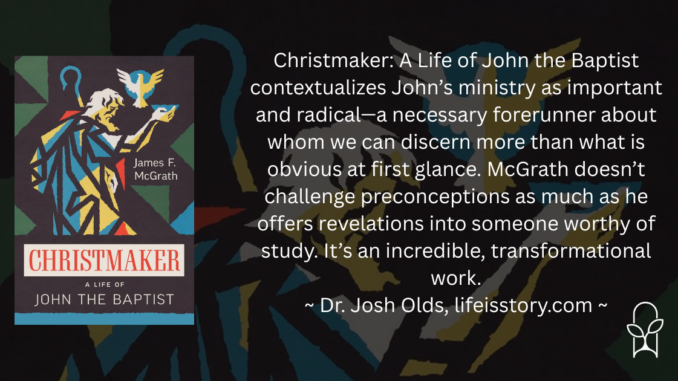
Also by this author: Exploring the Paranormal: Miracles, Magic, and the Mysterious
Published by Eerdmans on June 11, 2024
Genres: Non-Fiction, Biography
Buy on Amazon
Goodreads

Meet the real John the Baptist.
For many, John the Baptist is a footnote in the gospels—Jesus’s unkempt forerunner. But if we look closer, John emerges as a fascinating and influential religious leader in his own right.
Esteemed New Testament scholar James F. McGrath turns his critical eye to overlooked details in Scripture and long-neglected sources to discover who John the Baptist really was. McGrath covers the well-known events of John’s life, from his miraculous conception to his execution at the hands of Herod Antipas. Along the way, he introduces key context about John’s social and religious world that fleshes out John’s character. John becomes a rebel son of a priest. An innovator of ritual. A mentor of Jesus.McGrath also explores John’s far-reaching impact on the history of religion. Aside from his influence on Christianity, Judaism, and Islam, John is also revered by the Mandaeans, the last extant gnostic sect, who consider themselves John’s faithful disciples. This fresh look at the life of John the Baptist will fascinate any reader interested in John, Jesus, and their dynamic world.
John the Baptist is often seen an apertif, an amuse-bouche, a prelude, or an entry into the story of Jesus. He whets our appetite for the Kingdom of God by dancing in his mother’s womb at the news of Jesus’s conception, he builds a following for Jesus to begin his ministry, and he serves as a foreshadowing of the violent death of Jesus at the hands of the state. And we are not incorrect to see John as someone in the shadow of Jesus. John himself says “I must decrease.” But there is much we can learn about the life, ministry, eschatological context, and influence of John’s ministry. Christmaker: A Life of John the Baptist contextualizes John’s ministry as important and radical—a necessary forerunner about whom we can discern more than what is obvious at first glance.
James McGrath begins his survey of John by calling him a rebellious son. He reminds readers that John’s father was a priest and not only did John eschew that profession, he seems to be actively undermining that institution. John comes from the religious elite, yet his entire ministry is a political and spiritual rebellion against it. The next chapter focuses on John as baptizer, inventing the concept of Christian baptism, modifying the ritual purity cleanses of Judaism and offering not just ritual forgiveness but a supernatural, mystical experience of rebirth. Christmaker also spends significant time on John’s eschatology—his theology of the coming Christ and his Kingdom. The book concludes with a discussion about how the influence of John the Baptist came to be so widespread while the person of John often fades into the background despite his rather unique personality.
I’ll just be honest: I haven’t thought much critically about John the Baptist. I mean, I know the stories. I read this book in January, so the Christmas story in which John plays an unseen but important role, are fresh in my mind. I’ve often used John as an example of how God works through the unexpected, using Luke 3:1-2, which lists all the contemporaneous political and religious leaders, and then concludes with “The word of the Lord came to John.” Everything McGrath presents in Christmaker about John is clear, compelling, and honestly somewhat obvious. McGrath isn’t offering speculation or an imaginative rendering of John, he’s just dragging him into the spotlight—not for John’s sake, but so that through that illumination we might ourselves be drawn closer to Jesus and have a model for ministry.
Rarely do I read a book about the Bible and think “Wow, I’ve never considered that” and it not be about some especially obscure and mostly trivial topic. I think that the last time it happened was reading Drew Hart’s The Trouble I’ve Seen where he contextualizes Barabbas. It’s this lightbulb moment of understanding, of putting the puzzle pieces together in the obvious fashion, that happens throughout Christmaker. McGrath doesn’t challenge preconceptions as much as he offers revelations into someone worthy of study. It’s an incredible, transformational work.
